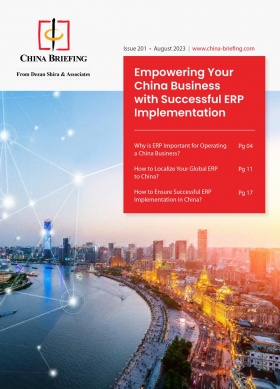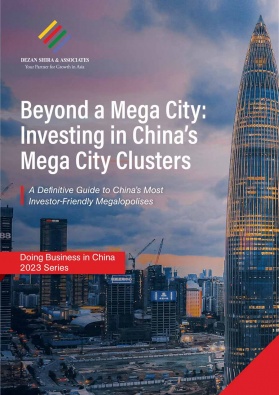Chinese Government Restructuring Explained – Changes to State Council Agencies
New details on the restructuring of several key State Council bodies shows further consolidation of responsibilities in line with current government priorities.
At the end of September 2023, the General Office of the CPC Central Committee (CPCCC) and the Office of the State Council released several announcements on the ongoing Chinese government restructuring, providing further details on the reorganization of these ministries under China’s State Council. This reorganization forms part of the country’s customary State Council restructuring, which takes place every five years after the start of a new National People’s Congress (NPC).
The restructuring of State Council bodies was kicked off during the 2023 Two Sessions in March, when the State Council released the State Council Institutional Reform Plan (the Reform Plan).
The Reform Plan, which stipulates changes to several government bodies, the establishment of new ministries, and a major overhaul of the financial system, aims to consolidate the duties and responsibilities of various ministries while giving a higher status to certain state organs to strengthen and standardize regulatory oversight and policymaking.
The new announcements provide more details on the reorganization of the Ministry of Industry and Information Technology (MIIT), the People’s Bank of China (PBOC), the Ministry of Ecology and Environment, the National Health Commission (NHS), and the Chinese Academy of Social Sciences (CASS). The Ministry of Science and Technology (MOST) is also undergoing a major overhaul, but further details on its restructuring plan have not yet been released.
Below we provide an overview of the roles and responsibilities of each of these bodies and discuss how they will be restructured.
Ministry of Industry and Information Technology
What does it do?
Formed in 2008, the MIIT is China’s top industry planner, responsible for formulating and implementing industry plans, policies, and standards, monitoring the industry, and promoting and guiding industry development.
The MIIT was established during the State Council restructuring that took place after the convening of the 17th NPC, taking over several responsibilities related to industry and information technology from the National Development and Reform Commission (NDRC), China’s macroeconomic planner.
What’s changing?
Under the latest reorganization, the MIIT will be taking over several areas of work from other ministries and bodies, further consolidating work related to the development of industry under one department.
The first is taking over responsibilities related to high-end technology and science and technology development from the Ministry of Science and Technology (MOST). This includes formulating plans and policies for high-tech development and industrialization, guiding the construction of national independent innovation demonstration zones, national high-tech industrial development zones, and other science and technology parks, and overseeing the development of technology service industries, technology markets, and technology intermediary organizations.
In addition, MOST’s High-tech Department and Achievements Transformation and Regional Innovation Department will be moved to be under the oversight of the MIIT.
Finally, the State Council’s Leading Group for Promoting the Development of Small and Medium-sized Enterprises (SMEs) will be dissolved, and all of its responsibilities will instead be undertaken by the MIIT’s SME Bureau.
The People’s Bank of China
What does it do?
The PBOC is China’s central bank, responsible for the country’s monetary policy and currency issuance, among other duties. The bank is still responsible for some duties related to the regulation of the banking and financial sector, although much of this work has been transferred to other bodies.
What’s changing?
The reorganization will see changes made to the responsibilities of several agencies under the PBOC, as well as changes to the organization structure and leadership positions. The restructuring will see the PBOC’s agencies take on new responsibilities while also ceding some work to other bodies.
The adjustments to the PBOC’s agencies’ responsibilities are as follows:
- The Financial Stability and Development Committee of the State Council will be dissolved, and its responsibilities will be transferred to the Office of the Central Financial Commission under the PBOC.
- The PBOC’s daily supervision responsibilities of financial holding companies and other financial groups will be transferred to the National Financial Regulatory Administration (NFRA). The NFRA is a new government body for the most part replacing the previous China Banking and Insurance Regulatory Commission (CBIRC). The NFRA now supervises the entire financial industry, except securities, which will remain under the jurisdiction of the China Securities Regulatory Commission (CSRC).
- The PBOC’s responsibilities for establishing and improving the basic system for financial consumer protection will be assigned to the NFRA.
Changes to the PBOC agencies’ structures and organization are as follows:
- The Secretariat of the Office of the Financial Stability and Development Commission of the State Council, located at the PBOC, will be integrated into the Office of the Central Financial Commission (CFC). The CFC is another new body established following the 2023 Two Sessions, which is responsible for supervising the financial system. The body falls under the Central Committee of the CCP (CCCCP), not the State Council.
- The PBOC’s Financial Consumer Rights Protection Bureau will be dissolved, and the responsibilities of coordinating and promoting matters related to inclusive finance, originally undertaken by this bureau, have been transferred to the Financial Markets Department (also under the PBOC).
- The PBOC’s Macro-Prudential Management Bureau will no longer assume the daily supervision responsibilities of financial holding companies and other financial groups. It will instead take on responsibilities for coordinating online financial supervision and formulating and organizing the implementation of macro credit guidance policies related to the field of real estate finance from the Financial Markets Department.
Ministry of Ecology and Environment
What does it do?
The MEE is the main authority responsible for environment and ecological protection in China. Its duties include formulation and implementation of environmental policies and regulations, including policies to achieve China’s dual carbon emissions targets, as well as environmental monitoring and supervision in areas such as pollution control and reduction work.
What’s changing?
The MEE will take over several responsibilities related to environmental and ecological protection from other government departments.
First, the MEE will take over responsibilities for formulating plans and policies to promote science and technology in ecological and environmental development from MOST. In addition, four administrative staff members and one department-level leadership position of the social development science and technology department (under MOST) will be transferred to the MEE.
Second, the Leading Group for Air Pollution Prevention and Control in Beijing-Tianjin-Hebei and Surrounding Areas, along with all of its offices, will no longer be under the MEE. In addition, the Atmospheric Environment Department of the MEE will no longer display the brand of the Atmospheric Environment Management Bureau of Beijing-Tianjin-Hebei and Surrounding Areas.
National Health Commission
What does it do?
The NHC is China’s top health authority, responsible for formulating and implementing national health policies, as well as drafting laws and regulations for the development of public health services. It also supervises medical services and formulates administrative measures for medical institutions and the medical services industry. The commission was formed in 2018 following the previous State Council restructuring.
What’s changing?
The NHC will take over certain responsibilities from other ministries, while also handing over some responsibilities to other ministries and departments.
First, it will be taking over the responsibility for organizing and formulating plans and policies for science and technology to promote health development from MOST.
Secondly, the NHC will cede certain responsibilities to the Ministry of Civil Affairs (MCA). These include its responsibilities to organize, formulate, coordinate, and implement policies and measures to deal with population aging, and the responsibilities of the National Working Committee on Aging (which is under the NHC). Moreover, the China Association on Aging, which hitherto has been managed by the NHC, will be transferred to the MCA.
Chinese Academy of Social Sciences
What does it do?
The CASS is an academic institution, research center, and think tank, focused on the fields of philosophy and social sciences. It encompasses a range of research and educational institutions, including the University of Chinese Academy of Social Sciences (UCASS) and the Graduate School of Chinese Academy of Social Sciences (GSCASS) in Beijing.
What’s changing?
The changes to CASS are mainly related to the so-called “local chronicles”, or local historical documents. First, the responsibility of the guiding group for the mandate of local chronicles under CASS will be dissolved. This guiding group’s office will be renamed the China Local Chronicle Work Office and will continue to bear the brand of the National Local Chronicles Museum. The China Local Chronicle Work Office will be managed by CASS on behalf of the Central Leading Group for Propaganda, Ideology and Culture.
Ministry of Science and Technology
What does it do?
The MOST is primarily responsible for formulating and facilitating the implementation of policies related to the development of science and technology in China, which includes promoting sci-tech innovation, research, and talent cultivation and attraction, among other areas.
What’s changing?
Although the CPCCC and the State Council have not yet released a detailed plan for the changes to the MOST. However, we can see from the other ministries’ plans that the MOST will hand over several responsibilities to other ministries and institutions.
These include:
- Ceding responsibilities related to high-end technology and science and technology development to the MIIT;
- Transferring the High-tech Department and Achievements Transformation and Regional Innovation Department to be under the MIIT;
- Ceding responsibilities for formulating plans and policies to promote science and technology in ecological and environmental development to the MEE; and
- Ceding responsibility for organizing and formulating plans and policies for science and technology to promote health development to the NHC.
The Reform Plan released in March 2023 has already provided some details on how the MOST will be restructured. The changes include the establishment of the Central Science and Technology Committee, which will be overseen by MOST.
Why are these ministries undergoing reorganization?
As mentioned previously, the reorganization of government ministries is a standard procedure conducted every five years following the convening of a new NPC for the first time. The primary aim of this type of restructuring is to better organize the powers and responsibilities of the various agencies in line with China’s current policy and development priorities.
One of the most significant changes in this year’s restructuring has been to China’s financial regulatory system, as seen by the establishment of the new regulatory authority, the NFRA.
The changes to the PBOC are mainly the transfer of regulatory and supervisory responsibilities to the NFRA (as well as the CRSC, the securities regulator), helping to consolidate the financial regulatory and supervisory responsibilities of the institutions. This consolidation is also designed to “solve the long-standing contradictions and problems in the financial field”, according to the Reform Plan, and reduce overlapping responsibilities or redundancies in the system.
The MOST has also seen a significant overhaul, ceding of various sci-tech-related responsibilities to other agencies where applicable. The restructuring of MOST reflects China’s sci-tech ambitions in recent years, as sci-tech development has risen to the top of the country’s policy agenda. By handing over more granular responsibilities to other agencies, the MOST can strengthen its macro-planning capabilities, enabling it to better focus time and resources on areas such as strategy and planning, system reform, resource planning, and policy and regulatory work.
In line with this, the Reform Plan also announced the establishment of the National Data Bureau (NDB), which will be responsible for managing data resources, coordinating the development of digital infrastructure, and promoting digital society and economy plans. The NDB will also serve an important role in China’s sci-tech ambitions by helping to promote digital transformation and advancing data-driven high-end technologies such as artificial intelligence.
About Us
China Briefing is written and produced by Dezan Shira & Associates. The practice assists foreign investors into China and has done so since 1992 through offices in Beijing, Tianjin, Dalian, Qingdao, Shanghai, Hangzhou, Ningbo, Suzhou, Guangzhou, Dongguan, Zhongshan, Shenzhen, and Hong Kong. Please contact the firm for assistance in China at china@dezshira.com.
Dezan Shira & Associates has offices in Vietnam, Indonesia, Singapore, United States, Germany, Italy, India, Dubai (UAE), and Russia, in addition to our trade research facilities along the Belt & Road Initiative. We also have partner firms assisting foreign investors in The Philippines, Malaysia, Thailand, Bangladesh.
- Previous Article China Q3 2023 Economic Roundup: GDP Growth Beats Forecasts
- Next Article China-Latin America and the Caribbean: Investment, Trade, and Future Prospects








